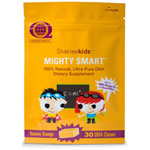
|
| SKU #: |
|
SP1241657293
|
| Name: |
|
Shakleekids Mighty Smart
|
| Charge |
|
$
35.25 |
| Quantity: |
|
0
|
| Description: |
|
Supertasty and supersafe, Shakleekids Mighty Smart is scientifically formulated with a power-packed blast of 100% natural, ultra-pure DHA. Each great-tasting chew provides 100 mg of this essential brain nutrient. DHA has been shown to support a mighty memory, mad concentration, and fierce mind skills. In addition, it promotes healthy eyes and rad vision for your multitalented, multitasking superhero.
Supplies ultra-pure DHA to support early brain and eye development
DHA is obtained from omega-3 oil that meets Shaklee's high standards for purity and potency
Certified organic by Quality Assurance International
75% organic
No artificial colors, sweeteners, or preservatives
Natural orange flavor
Star-K Kosher certified dagim
Gluten free
Directions:
Children 4 years of age and older, take one chew per day, preferably with meals
Children 2 and 3 years of age who can safely chew, take one chew per day, preferably with meals
Proper Brain Development Starts Early:
By age 5, a child’s brain is 3.5 times larger than it was at birth.
DHA supports brain health and normal cognitive function, including memory, focus, concentration, and attention.
At birth, DHA makes up about 97% of all the omega-3 fatty acids in the brain-and 93% in the retina. To help maintain these levels, kids should consume DHA on a regular basis.
Fish Is the Main Source of DHA, But . . .
Eating large amounts of certain types of fish may be dangerous. According to the Food and Drug Administration and the Environmental Protection Agency, some fish contain mercury and other contaminants that may affect brain and neurological development in young children. Supplementation with an ultra-pure source is a safe way to increase DHA intake.
Foods that are rich in DHA include sardines, tuna, and organ meats such as liver-all of which are foods that kids in the U.S. generally don’t like.
Is Your Child Eating the Right Foods?
The World Health Organization, Institute of Medicine-Food and Nutrition Board, and the American Heart Association all have recently called for increased consumption of omega-3 fatty acids, including DHA, because of their positive effects on health.
Most children do not get enough DHA from diet alone. Studies in the U.S. have found that the majority get only 20-40 mg a day.
|

|
|

